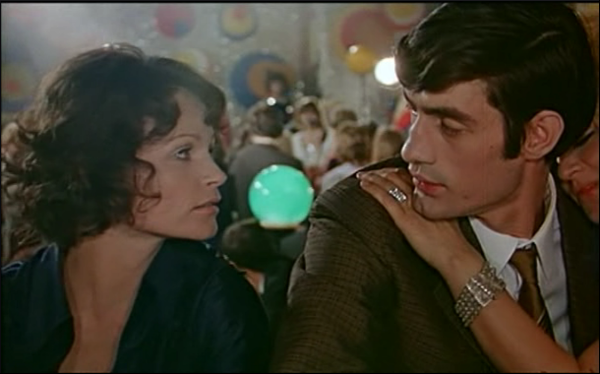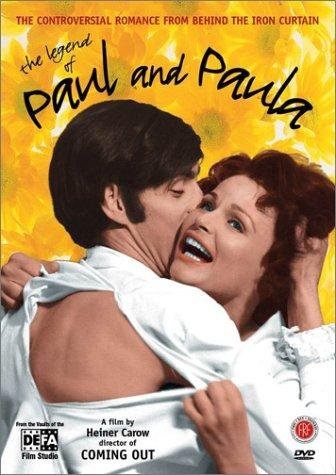The Legend of Paul and Paula is the most successful movie ever produced in the former German Democratic Republic (GDR). It’s a tragic comedy centering on forbidden love and thematizing social problems in a socialist state. Because of the latter subject matter, The Legend of Paul and Paula was almost not released, but Erich Honecker, who was then the leader of the GDR, finally gave his permission after watching the movie. It is a great way to immerse oneself in the time and atmosphere of East Berlin during the early 1970s. Even though the film is at times surrealistic, viewers might enjoy the many contemporary details, like the clothing, the furniture, the technology, and the pop culture, and they might also recognize the subtle criticisms pointed at the governing regime.
"Not only is the movie a document of its time, but it is also entertaining and touching."
In the movie, Paul, a young bureaucrat, is married to Ines, a beautiful yet rather feeble-minded woman. Together, they live in a modern multistory building and lead a conservative existence. They have a child, but their marriage is not a happy one. She is constantly unfaithful, while he looks down on her and is generally bored with his life. Meanwhile, Paula is a pretty single mother with two children. She lives on the other side of the street and works at a bottle deposit counter in a supermarket. She has an admirer, the elderly and respectable tire salesman Herr Saft, who would be a good husband and provider. However, she would much rather have a passionate and loving relationship. She is lighthearted and heady, and she wants to embrace life instead of just “working and sleeping.” When she decided she deserves more than just routine, she goes to a music club and meets Paul. They fall in love and a relationship develops between them. Paula is ready to give up everything for Paul, but he’s held back by social pressures and is hesitant to commit.
Not only is the movie a document of its time, but it is also entertaining and touching. The central theme of the movie is the conflict between fulfilling the demands of society and conscience and satisfying the innermost human need of love, acceptance, and freedom. The filmmakers use surrealistic and fantastic elements to emphasize these warring impulses. The most famous scene is probably the protagonists’ boat ride down the Berlin Spree, alongside a long-deceased family of river boatmen. If love can change a man’s perspective on life, then maybe it can do the same for all society.

Since the film is set in East Berlin, some characters speak the Berlin dialect, especially those from a working class background. This includes Ines, who is portrayed as rather unsophisticated, drawing a connection between the use of the dialect and those with a low level of education. Along with her family, she contributes some funny moments to the movie. They speak with such thick accents that some non-Berliners might not even be able to understand them. This is evident at the beginning, when Paul meets Ines for the first time. Her character is introduced through the way she speaks: “Mensch, wie jeht’s denn?” (or, in standard German, “Na, wie geht es denn ?,” meaning “Well, how are you?”). During the course of the film, she delivers other gems of Berlin dialect. Crumbling her dress is not “zerknittern” but “ szaknitta’n ,” making the “z” sound like [s]. She also ends many sentences with the typical Berliner “... wa ?” meaning something along the lines of: “...no?” It is a way of seeking affirmation.
Her mother, in turn, uses the East German word “Piepel ” (young boy or random guy). She also exclaims, “Fass ma nich an, doah!” (or “Fass mich nicht an, du !” meaning “Don’t you touch me!”). This phrase contains the Berlin transformation of “ mich ” into “ ma ,” the dropping of the “ t ” in “nicht ,” and the infamous “doah !” as a threatening “you!” Later in the film, she accuses Paul of not buying his son a new bike, and says, “Koofst ihm ja keen Rolla, dit alte Schabrack !” (or “Kaufst ihm ja keinen Roller, das alte Ding !”). Here, the “au” diphthong is transformed into a double “oo” in the word “kaufst,” which is typical of the Berlin dialect. The same happens with the “ei” in “kein,” becoming “ee.” “Dit” is also the Berlin equivalent of “das,” and both “dit ” and “det” are common forms. “Schabrack” is a loanword from Polish, and it translates as “old wreck.” It is sometimes used as a derogatory term to describe an ugly woman. Elsewhere in the film, Ines’ father exclaims, “Rinn’ ins Verjnüjen!” (or “Rein ins Vergnügen!”). This is almost unpronounceable for a foreigner and is a good example of the famous Berlin transformation of “g” to “j.”
"The central theme of the movie is the conflict between fulfilling the demands of society and conscience and satisfying the innermost human need of love, acceptance, and freedom."
Additionally, there is some use of the Saxon dialect, when Paula, at her workplace, encounters someone very eager to get rid of his bottles and receive a deposit. His very strong dialect makes the moment humorous, as his speech is contrasted to the film’s dominant Berlin dialect. He says he bought the beer only the day before, “Geschtern erscht gekauft ...!”(or “Gestern erst gekauft ...!”) and “Des is doch Betrug, de Menschen bescheißen hio!” (or “Das ist doch Betrug, (Sie wollen wohl) die Menschen hier bescheißen!”) Incidentally, the well-educated Paul speaks in High German, and though audiences can hear that Paula is from East Berlin, her dialect is not very strong, outside of a few local expressions like “Mostrich” (or “Senf,” meaning “mustard”).





